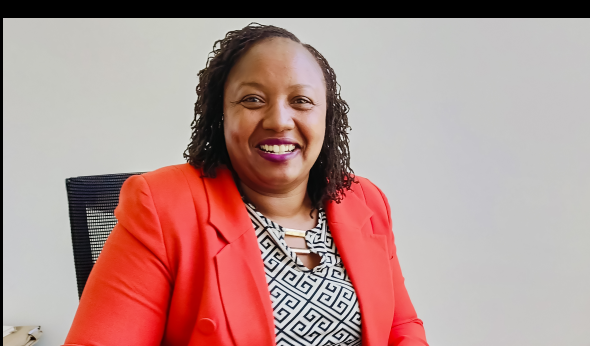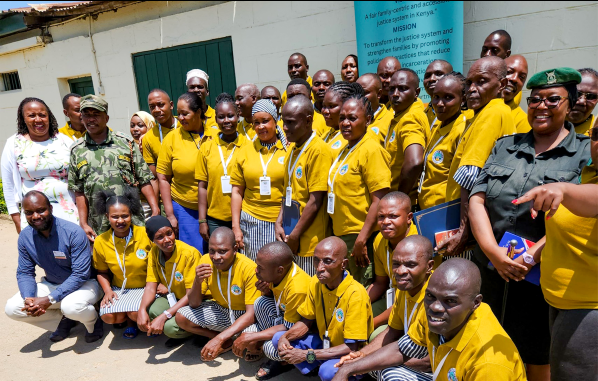

With Kenya’s prisons overflowing and 90% of incarcerated women being single mothers, High Court Advocate Miriam Wachira is helping them escape the prison cycle through legal support and mediation.
**By Conrad Onyango, bird story agency**
In May, a young Kenyan mother of three walked free from the grip of the criminal justice system, not because she beat the odds in court, but because someone believed she deserved a second chance.
The 15-year-old, identified as LM, had been charged with taking US$104 (Ksh 13,400) from her employer, an act born not of greed, but of desperation.
Her children were hungry and she had run out of options.
“She is now home with her children. When LM was referred to us, we saw more than a file number. We saw a mother. A worker. A woman in crisis,” recalls Miriam Wachira, an advocate of the High Court of Kenya and founder of Justice Nest, a legal support initiative focused on vulnerable women and children.
Wachira and her team intervened through mediation, arranged a repayment plan with her employer, and negotiated for her release.
“It was a huge leap in my life. I did not have hope that one day I would be released,” said an elated LM.
She is among nearly 20 similar cases handled by Justice Nest over the last one year, who, in their effort to provide, ended up imprisoned and separated from their children.
These women represent just a fraction of a larger, invisible population running into millions of incarcerated women across Kenya and other countries in Africa, where many are jailed for minor, non-violent offenses.
“Our prisons are overwhelmed, with many running at 40% over capacity and a huge percentage of inmates are petty offenders, particularly women,” said Wachira.
According to Kenya’s 2019 census, the number of single-parent households rose to 38%, up from 25% in 2009. Many of these households are led by women juggling multiple jobs to support themselves and their children.
“Almost 90 % of women in prisons are single mothers meaning their children are left home without caregivers,” she said.
While there is limited research on single motherhood, Kenya has been listed alongside South Africa, Ethiopia, Nigeria and Egypt among countries with the highest likelihood of women being single mothers by the age of 45.
Wachira, a seasoned legal practitioner with over 17 years in the justice sector, began her career advocating for children who were victims of crime and over time, she saw a broader, more systemic issue.
More women and children, she said, continue to suffer within a justice system that neither understands nor supports them, and seems to criminalise poverty. This realisation led her to establish Justice Nest anchored on two programs: the Mothers and Children Diversion program and the Prisons Paralegal program.
Under the Mothers and Children Diversion initiative, the organisation identifies single mothers facing minor charges and seeks alternatives to imprisonment such as mediation, restorative justice, and community-based solutions.
“We want to ensure mothers don’t go to prison if they don’t have to,” explains Wachira.
Wachira holds a Master of Laws (LLM) in International Human Rights and has a track record in advancing women’s rights, having worked with the Federation of Women Lawyers (FIDA) and involved in the paralegal sector for more than six years, training prison officers and inmates to serve as paralegals.
To democratise legal knowledge, Justice Nest has begun training both inmates and correctional officers as paralegals under its Prisons Paralegal program to equips them with a practical understanding of criminal law and procedure, skills to draft appeals and petitions, and the confidence to assert their constitutional rights.
“Many people in prison don’t know why they’re there or how to defend themselves. A court cannot make a fair ruling if it hasn’t heard both sides. We’re helping prisoners to tell their stories,” said Wachira.
This year, she has equipped more than 33 inmates and correctional officers with essential legal skills, drafting appeals, navigating court procedures, and even educating fellow inmates.
These paralegals are expected to work in Mombasa in the coastal city’s maximum and medium-security prisons and women’s prison.
“With these we are looking to serve about 3,800 people by end of the year. And with that, a third of them will be released from prison,” said Wachira.
In a partnership with the National Institute for Trial Advocacy (NITA) and the global law firm, Jones Day, Justice Nest announced its launch a Trial Advocacy training at Shimo la Tewa prison in Mombasa this June, targeting inmates, officers and legal service providers with hands-on courtroom skills.
The organisation seeks to addresses a glaring gap in many African justice systems, the lack of legal representation for pre-trial detainees.
In Kenya alone, over 60% of inmates, she said are still on remand—not yet convicted but confined for months or years due to backlogs and limited access to legal aid.
While some reforms have improved aspects of the justice system, Wachira warns that more systemic change is needed.
“Progress is happening, but it’s slow. Until we fix pre-trial detentions, overcrowding, and access to legal help, we will continue punishing poverty,” she explained.
While Kenya has a Legal Aid Act, she said it's not active. The country’s National Legal Aid Service is not well-funded and can barely offer the services, to the women who need it.
“We have that gap in the sense that there's an imbalance, because when you get to court, the judge is an advocate. The prosecutor is an advocate. The accused person is a layman who does not understand the system. So it's broken in that way,” she explained.
In a move to humanise Kenya’s criminal justice system, Attorney General Dorcas Oduor, Kenya’s first woman to hold the position, announced in September 2024 plans to reform the country’s criminal justice sector, with a focus on easing the burden it places on women.
“We are going to come up with an initiative to re-look at the criminal justice sector because, in the whole chain, it is women who suffer,” Oduor said during a women’s empowerment event.
Key reforms under consideration include the decriminalisation of petty offences, creating second chances for youth, and introducing alternatives to both prosecution and incarceration.
 Justice Nest's paralegal training team posing for a photo. Photo Courtesy: Miriam Wachira
Justice Nest's paralegal training team posing for a photo. Photo Courtesy: Miriam Wachira












